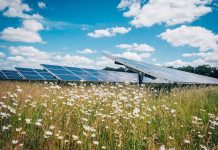Flexibility providers are succeeding in stabilising grids stressed by depressed power demand and renewables’ intermittency, academics advising biomass giant Drax suggest.
Margins for grid failure narrowed over 2020’s first three months, experts from Imperial College note in their latest Electric Insights, as Britain endured its coldest, wettest winter since records began. As severe storms swept Britain, output from wind farms soared, up 40 per cent over the quarter against 2019.
When wind output plummeted on calm days, stresses to the grid increased. In one incident, Imperial notes, just 0.2GW of spare generation capacity was available, compared to over 4GW the following day.
“It was flexible power stations, and action from businesses able to reduce their electricity usage, which helped prevent blackouts during cold, calm spells”, lead author Dr Iain Staffell writes.
Over the quarter, renewables contributed 40 per cent of generation, outstripping fossil fuels for the first time, and now effectively becoming baseload.
The start of lockdown in March reduced weekday demand as much as 13 per, adding to system volatility. Day ahead spot prices fell to £28/MWh, down a third year on year.
The quarter’s extreme conditions highlight how National Grid ESO and DNOs are having to manage complexity and multiple partners like never before. The report – and to date, no blackouts – suggests they are rising to the challenge.
“Having flexibility within the power system at these critical moments is crucial to keeping Britain’s lights on”, the report concludes.
See full details here.
Related stories:
DSR can bid for 15-year capacity market agreements
National Grid launches new footroom service to tackle lockdown lows
As solar breaks records, National Grid mulls turning it off
Coronavirus demand destruction gives National Grid another plate to spin
National Grid mulls footroom options as demand drops
Coronavirus and the power system: Keep calm and put the kettle on
Fintan Slye: Inertia has been taken for granted, it will become much more important
Lockdown lows make renewables the new baseload
Click here to see if you qualify for a free subscription to the print magazine, or to renew.
Follow us at @EnergystMedia. For regular bulletins, sign up for the free newsletter.



